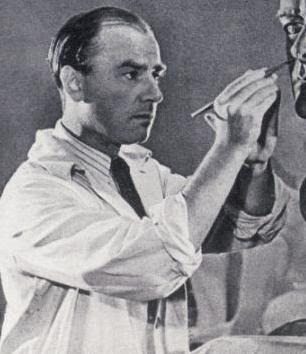Arno Breker
From Kaiserreich
|
Arno Breker (born on July, 19 1900 in Elberfeld, Germany) is a German sculptor, best known for his monumental nudes, which caused him a fine and immediate censorship in 1935 for indecency.
Breker was born in Elberfeld, in the north of Germany, the son of a stone mason. He began to study architecture, along with stone-carving and anatomy, and at age 20 was accepted to the Düsseldorf Academy of Arts where concentrated on sculpture. He made his first trip throughout Europe, including Paris, shortly before finishing his studies. During his journey he met with Jean Cocteau, Jean Renoir, Pablo Picasso, Daniel-Henry Kahnweiler, and Alfred Flechtheim. In 1927 he moved to Berlin, who had become the center of European culture after the fall of Paris to the Commune of France. He was quickly accepted by the art dealer Alfred Flechtheim. He also established close relationships with important figures in the art world, including Charles Despiau, Isamu Noguchi, Maurice de Vlaminck and André Dunoyer de Segonzac, of all of whom he later made portraits. He travelled to North Africa, producing lithographs which he published under the title "Tunisian Journey".
In 1932 he was awarded a prize by the Prussian Ministry of Culture, which allowed him to stay in Rome for a year. His neoclassical and monumental style received a warm reception from many German critics and personalities, who soon begin to order him portraits or busts. Various members of the German royal or ducal families had soon their own bust, including the Kronprinz Wilhelm. Breker was about to receive an order from the Kaiser Wilhelm II then he decided concentrate on nude statues, considering that "the purity and the beauty of the German male body deserve a full involvement from every artist in the world, but it will never be enough to grasp the essence".
His first series of nudes received a wide support, but soon the German laws about nudity, still very conservative, came after Breker: in November 1935, the German police forced one of his expositions to be cancelled, and later condemned him to a heavy fine and to the immediate seizure of all his nude statues as they presented "indecent subjects contrary to the morality and able to shock the German people". Breker decided to resort to an appeal and received support from the entire world, including Syndicalist artists.

